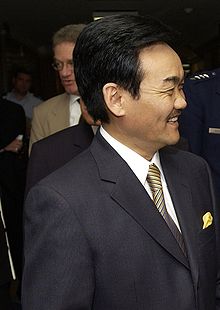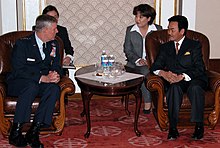Natsagiin Bagabandi
You can help expand this article with text translated from the corresponding article in Russian. (November 2018) Click [show] for important translation instructions.
|
Natsagiin Bagabandi | |
|---|---|
| Нацагийн Багабанди | |
 Bagabandi in 2004 | |
| 2nd President of Mongolia | |
| In office 20 June 1997 – 24 June 2005 | |
| Prime Minister | Mendsaikhany Enkhsaikhan Tsakhiagiin Elbegdorj Janlavyn Narantsatsralt Rinchinnyamyn Amarjargal Nambaryn Enkhbayar |
| Preceded by | Punsalmaagiin Ochirbat |
| Succeeded by | Nambaryn Enkhbayar |
| General Secretary of the Central Committee of the Mongolian People's Party | |
| In office 7 February 1997 – 6 June 1997 | |
| President | Punsalmaagiin Ochirbat |
| Premier | Mendsaikhany Enkhsaikhan |
| Preceded by | Nambaryn Enkhbayar |
| Succeeded by | Nambaryn Enkhbayar |
| Chairman of the State Great Khural | |
| In office July 1992 – July 1996 | |
| Preceded by | Radnaasümbereliin Gonchigdorj of Little Khural |
| Succeeded by | Radnaasümbereliin Gonchigdorj |
| Personal details | |
| Born | 22 April 1950 Yaruu, Zavkhan, Mongolian People's Republic |
| Political party | Mongolian People's Party |
| Spouse | Azadsurengiin Oyunbileg[1] |
| Children | 2 |
Natsagiin Bagabandi (Mongolian: Нацагийн Багабанди; born 22 April 1950) is a Mongolian politician who served as the 2nd President of Mongolia from 1997 to 2005.[2] He won the 1997 presidential election and subsequently the 2001 presidential election, serving a total of two terms. Prior to running for president, he served as the Chairman of the State Great Khural from 1992 to 1996 and the Secretary General of the Party Leadership Council of the Mongolian People's Revolutionary Party (now known as the Mongolian People's Party) from February to June 1997.
He was the first person to be the director of Oyu Tolgoi LLC, serving from 2010 to 2013[3] and then again from 2016 to 2023.[4]
Early life and career
[edit]Bagabandi was born on 22 April 1950 in Zavkhan, Mongolia as the 5th child of a herder family.[5] In 1979 he joined the Mongolian People's Revolutionary Party. He studied in Leningrad (Leningrad Technical School of the Refrigeration Industry), Ukraine (Odessa Technological Institute of the Food Industry) and Moscow (Academy of Social Sciences at the Central Committee of the CPSU), and graduated in Food engineering. In 1987, he received a doctorate in Philosophy.[6][circular reference] He became Chairman of the State Great Khural in 1992, serving for four years.[7]
In early 1997, he became General Secretary of the MPRP, shortly before the presidential elections, which were held in difficult conditions for the party as it had lost to the Democratic Union Coalition prior in the 1996 parliamentary election. The DUC had won 50 seats out of 76 in the State Great Khural while the MPRP had only won 25 seats.
However, Bagabandi won the 1997 presidential election with 62.53% of the vote, defeating his predecessor Punsalmaagiin Ochirbat who had won 30.65% of the vote. He became the 2nd President of Mongolia and the 1st President to be elected from the MPRP. He won re-election in 2001 with 59.19% of the vote, beating Radnaasümbereliin Gonchigdorj by a margin of 12%.[8] He was the first Mongolian president to win a second term.
Presidency (1997-2005)
[edit]Unstable government
[edit]In his first 4 years in office, he overlooked a total of 4 DUC prime ministers, frequent scandals and government crises. His first PM, Mendsaikhany Enkhsaikhan, the 17th Prime Minister of Mongolia, serving from July 1996, resigned in April 1998 due to growing tensions between him and other party leaders in the DUC.
The State Great Khural elected (61-6) the chairman of the DUC, Tsaikhiagiin Elbegdorj, arguing that the leader of the winning party in the 1996 election should be the prime minister. In 1998, following Elbegdorj's decision to sell the state-owned Reconstruction Bank to Golomt Bank, the minority MPRP called for the resignation of Elbegdorj and soon after, he lost the no confidence vote.
The DUC nominated Davaadorjiin Ganbold seven times, Galsanpuntsagiin Gankhuyag and Erdeniin Bat-Üül a couple of times to be the next PM but on each occasion, President Bagabandi rejected it.[9] During the ensuing government crisis, prominent figure of the 1990 Revolution and Member of Parliament, Sanjaasürengiin Zorig was assassinated in October, thousands mourned his death and to this day, the case still remains unsolved. Elbegdorj stayed in office until Janlavyn Narantsatsralt was nominated and accepted by the president in late 1998. However, Narantsatsralt was forced to resign from office in 1999 due to backlash from a controversial letter to the Russian Federation. Rinchinnyamyn Amarjargal succeeded him and served as PM for a year until the 2000 parliamentary elections.
The MPRP secured an overwhelming supermajority in the 2000 elections and won 72 seats out of 76. The DUC lost 49 seats and won only a single seat in the State Great Khural. Chairman of the MPRP, Nambaryn Enkhbayar became the 21st Prime Minister of Mongolia and served full term. He would later on be elected to succeed Bagabandi in the 2005 presidential election, with 54.17% of the vote.[10]
Foreign policy
[edit]
On 13 November 2000, President of the Russian Federation, Vladimir Putin made a historic visit to Mongolia at the invitation of President Bagabandi, which re-strengthened the bilateral relations between the two countries.[11] This was the first visit made by a Russian head of state since Leonid Brezhnev in 1974. Price of russian fuel exports to Mongolia was lowered and bilateral economic cooperation was expanded following the signing of the Ulan Bator Declaration the next day.[12]
On 29 September 2003, President Bagabandi made an address to the 58th Session of the United Nations General Assembly. In his speech, he supported the reforms in the UN, establishment of nuclear-weapon-free zones in the Korean Peninsula and among other things.[13]

During a period of remarkable developments in the relationship between the United States and Mongolia, Many visits and meetings between the two sides were made during Bagabandi's presidency.
One such notable visit was on July 15, 2004 when President Bagabandi made a momentous visit to the United States at the invitation of then President of the United States, George W. Bush.[14] During his visit, the two sides discussed about a wide range of bilateral issues from combatting global terrorism to promoting democracy and expanding trade and economic cooperation.[15] He also visited the Pentagon and was greeted by Chairman of the Joint Chiefs of Staff General Richard B. Myers, who visited Ulaanbaatar prior in January.
Peacekeeping missions
[edit]Mongolia took extensive steps in developing its peacekeeping capabilities and by the orders of President and Commander-in-chief Bagabandi, the newly founded 150th Battalion was chosen for the preparation for peacekeeping missions.[16]
In the aftermath of the 9/11 attacks, Mongolia became one of the 48 countries in support for the US-led "Coalition of the willing" in the US 2003 Iraq Invasion and showed remarkable commitments in peacekeeping despite its small size. This was the first active deployment made by the Mongolian Armed Forces in the 21st century.[17]
Personal life
[edit]He is married with two children.
After the end of his presidential term, Bagabandi became a low-profile figure in politics and published several volume of books about meditation and philosophy, called "Crown Words" (Mongolian: Титэм Үгс, romanized: Titem Ügs).
Awards and honors received by Bagabandi Natsag
[edit]| Country or Institution | Award | Date |
|---|---|---|
| Order of Genghis Khan[18] | 13 July 2011 | |
| Order of Sukhbaatar[19] | 13 September 2006 | |
| Grand Cross of the Hungarian Order of Merit[20] | 2005 | |
| Order of Friendship[21] | 19 April 2000 | |
| Medal "70 Years of the Mongolian People's Revolution" | 1991 |
Honorary degrees
[edit]| Country | School | Degree | Date |
|---|---|---|---|
| Indiana University Bloomington | Honorary Doctorate[22] | 2005 | |
| National Academy of Governance | Honorary Doctorate | 1999 | |
| Senshu University | Honorary Doctorate | 1998 | |
| Ankara University | Honorary Doctorate | 1998 | |
| Abai Kazakh National Pedagogical University | Honorary Doctorate | 1998 | |
| Odesa National Academy of Food Technologies | Honorary Doctorate[23] | 1995 | |
Works
[edit]References
[edit]- ^ Naltchayan, Joyce (July 16, 2004). "Laura Bush greets Azadsurengiin Oyunbileg, wife of President Natsagiyn Bagabandi of Mongolia, in the Yellow Oval Room Friday". White House. Retrieved October 30, 2015.
- ^ "Stocks". 11 August 2023.[dead link]
- ^ Ариунаа, Э. (2022-01-05). "МАН-ын "мода"-наас гардаггүй хууччуул | News.MN". News.MN - Мэдээллийн эх сурвалж (in Mongolian). Retrieved 2024-10-04.
- ^ IKon.mn, Б. Бадамгарав (2023-04-12). "Ерөнхийлөгч асан Н.Багабанди "Оюу Толгой" ХХК-ийн ТУЗ-ийн гишүүнээс чөлөөлөгдөх хүсэлтээ өгчээ". ikon.mn. Retrieved 2024-10-04.
- ^ "Biyografi.net: Natsagin Bagabandi".
- ^ "Нацагийн Багабанди — Википедиа нэвтэрхий толь" (in Mongolian). Mn.m.wikipedia.org. Retrieved 2023-01-24.
- ^ "УБХ, УИХ-ын дарга нарын хөрөг зураг - Мэдээллийн дэлгэрэнгүй - Parliament". www.parliament.mn.
- ^ Europa World Year Book 2, Book 2. Taylor & Francis. 2004. ISBN 978-1-85743-255-8.
- ^ ikon.mn (2020-07-02). "Ерөнхий сайд, сайдыг томилоход Ерөнхийлөгчтэй зөвшилцөх мэт ярих нь Үндсэн хуулийн хэллэгт нийцэхгүй". ikon.mn. Retrieved 2024-10-06.
- ^ People's Daily [permanent dead link]
- ^ "Russian President Vladimir Putin met with Mongolian President Natsagiyn Bagabandi". en.kremlin.ru. 2000-11-13. Retrieved 2024-10-04.
- ^ "The Presidents of Russia and Mongolia signed the Ulan Bator Declaration". en.kremlin.ru. 2000-11-14. Retrieved 2024-10-04.
- ^ "ADDRESS BY HIS EXCELLENCY MR. NATSAGIIN BAGABANDI PRESIDENT OF MONGOLIA TO THE 58TH SESSION OF THE UNITED NATIONS GENERAL ASSEMBLY" (PDF). United Nations. 29 September 2003. Archived from the original (PDF) on 2009-05-12.
- ^ "History of the U.S. and Mongolia". U.S. Embassy in Mongolia. Retrieved 2024-10-06.
- ^ Bold, Ravdan. "Mongolia-United States Relations: Seeking a Strategic Partnership Based on Democracy" (PDF). Ambassador of Mongolia to the United States. pp. 1–3.
- ^ Bayarmagnai, Byambasuren. "CHALLENGES FACING MONGOLIA'S PARTICIPATION IN COALITION MILITARY OPERATIONS" (PDF). USAWC Strategy Research Project: 15 – via U.S. Army War College.
- ^ McCarthy, Rory; Babylon (2003-09-29). "Mongolians join multinational force". The Guardian. ISSN 0261-3077. Retrieved 2024-10-06.
- ^ ""Чингис хаан" тэргүүн зэргийн одон хүртсэн эрхмүүд". eagle.mn. Retrieved 2024-10-04.
- ^ "Н.Багабанди "Сүхбаатарын одон" хүртлээ". Archived from the original on 2016-03-04. Retrieved 2011-06-13.
- ^ hu:A Magyar Érdemrend nagykeresztje a nyaklánccal és az arany sugaras csillaggal
- ^ Указ Президента Российской Федерации от 19 апреля 2000 года № 696 «О награждении орденом Дружбы Н. Багабанди»
- ^ "Former president of Mongolia to receive honorary degree: IU News Room: Indiana University". newsinfo.iu.edu. Retrieved 2024-10-04.
- ^ "Odessa National Academy of Food Technologies". universities.studyinukraine.gov.ua. Retrieved 2024-12-08.
